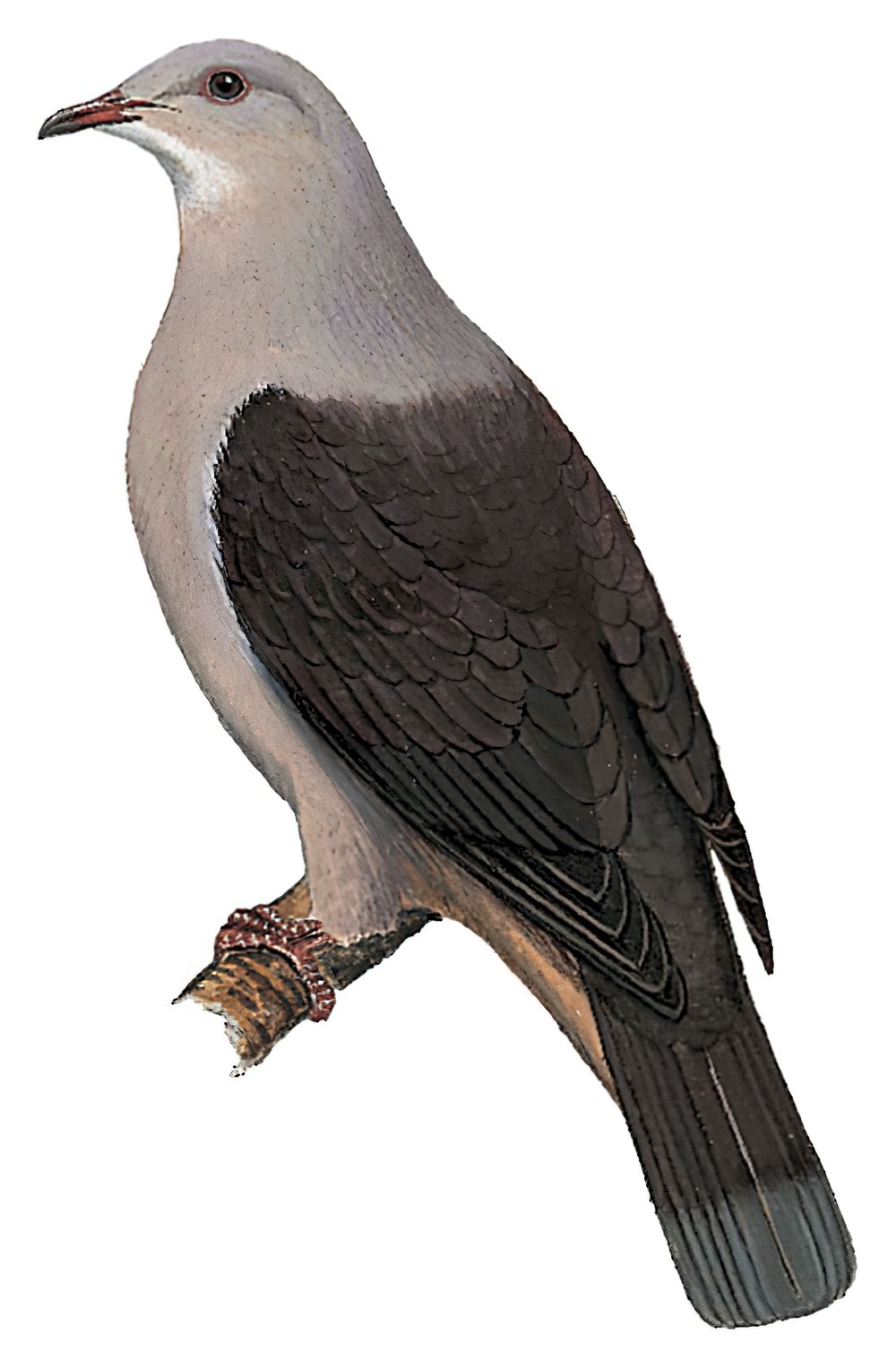Mountain Imperial-Pigeon / Ducula badia

Mountain Imperial-Pigeon
SCI Name:
Protonym: Columba badia Trans.Linn.Soc.London(1), 13 p.317
Taxonomy: Columbiformes / Columbidae / Ducula
Taxonomy Code: moipig1
Type Locality: Sumatra = Benkulen, western Sumatra.
Author: Raffles
Publish Year: 1822
IUCN Status:
DEFINITIONS
DUCULA
(Columbidae; Ϯ Mountain Imperial Pigeon D. badia insignis) Nepalese name Dukul for the imperial pigeons (cf. Hindi names Dunkul and Doomkul); "Genus or Sub-genus — DUCULA nobis. — DUKUL OF THE NIPALESE (genericé) Character of the genus:—bill equal to the head, straight, cylindric, very feeble; both mandibles membranous for three-fourths from the gape; tip of the upper mandible gently inclined—of the lower, strongly compressed; nares broad, linear, obliquely transverse, central; their groove faint; their tect subtumid. Wings short, not rounded, 3, 4, 5 quills sub-equal and longest; central primaries with their tips wavily truncated. Tail 14, long, strong and square; tarsi very low, and plumed nearly to the toes laterally, less in front; toes depressed with broad flat soles; lateral fores sub-equal, hind large; nails strong, arched and acuminated; central and hind equal, lateral fores equal, less; orbits nude; plumage simple. The above is a tedious charcater, but it is a distinct one. Those who love more summary proceedings may perhaps approve the following: "Bill and wings as in Goura; legs and feet as in Vinago." ... Lastly, though Ducula, like Vinago, be exclusively arboreal and fruit-eating; the latter is eminently gregarious—the former, almost a solitary. Species new. DUCULA INSIGNIS. Great Ducula, nobis." (Hodgson 1836); "Ducula Hodgson, As. Res., 19, 1836, p. 160. Type, by monotypy, Ducula insignis Hodgson." (Peters, 1937, III, p. 42).
Synon. Carpophaga, Carpophagella, Compsoenas, Globicera, Lamprura, Muscadivora, Muscadivores, Myriphaga, Myristicivora, Phaenorhina, Pterocolpa, Ptilocolpa, Rinopus, Serresius, Zonoenas, Zonophaps.
badia
L. badius chestnut-coloured, brown.
● ex “Cancrophagus castaneus” of Brisson 1760, “Crabier roux” of de Buffon 1770-1783, and “Chesnut Heron” of Latham 1785 (syn. Nycticorax nycticorax).
SUBSPECIES
Mountain Imperial-Pigeon (cuprea)
SCI Name: Ducula badia cuprea
cuprea
L. cupreus copper-, coppery < cyprium or cuprum copper.
● ex “Pigeon violet de la Martinique” of Brisson 1760, and “Pigeon de la Martinique” of d’Aubenton 1765-1781, pl. 162 (syn. Geotrygon martinica).
Mountain Imperial-Pigeon (badia Group)
SCI Name: Ducula badia [badia Group]
DUCULA
(Columbidae; Ϯ Mountain Imperial Pigeon D. badia insignis) Nepalese name Dukul for the imperial pigeons (cf. Hindi names Dunkul and Doomkul); "Genus or Sub-genus — DUCULA nobis. — DUKUL OF THE NIPALESE (genericé) Character of the genus:—bill equal to the head, straight, cylindric, very feeble; both mandibles membranous for three-fourths from the gape; tip of the upper mandible gently inclined—of the lower, strongly compressed; nares broad, linear, obliquely transverse, central; their groove faint; their tect subtumid. Wings short, not rounded, 3, 4, 5 quills sub-equal and longest; central primaries with their tips wavily truncated. Tail 14, long, strong and square; tarsi very low, and plumed nearly to the toes laterally, less in front; toes depressed with broad flat soles; lateral fores sub-equal, hind large; nails strong, arched and acuminated; central and hind equal, lateral fores equal, less; orbits nude; plumage simple. The above is a tedious charcater, but it is a distinct one. Those who love more summary proceedings may perhaps approve the following: "Bill and wings as in Goura; legs and feet as in Vinago." ... Lastly, though Ducula, like Vinago, be exclusively arboreal and fruit-eating; the latter is eminently gregarious—the former, almost a solitary. Species new. DUCULA INSIGNIS. Great Ducula, nobis." (Hodgson 1836); "Ducula Hodgson, As. Res., 19, 1836, p. 160. Type, by monotypy, Ducula insignis Hodgson." (Peters, 1937, III, p. 42).
Synon. Carpophaga, Carpophagella, Compsoenas, Globicera, Lamprura, Muscadivora, Muscadivores, Myriphaga, Myristicivora, Phaenorhina, Pterocolpa, Ptilocolpa, Rinopus, Serresius, Zonoenas, Zonophaps.
UPPERCASE: current genus
Uppercase first letter: generic synonym
● and ● See: generic homonyms
lowercase: species and subspecies
●: early names, variants, mispellings
‡: extinct
†: type species
Gr.: ancient Greek
L.: Latin
<: derived from
syn: synonym of
/: separates historical and modern geographic names
ex: based on
TL: type locality
OD: original diagnosis (genus) or original description (species)












